What is the difference between Hybrid Apps and Native Apps
A Comprehensive difference In Hybrid Apps V/S Native AppsLast updated on 03 Feb 2022 by Dezven
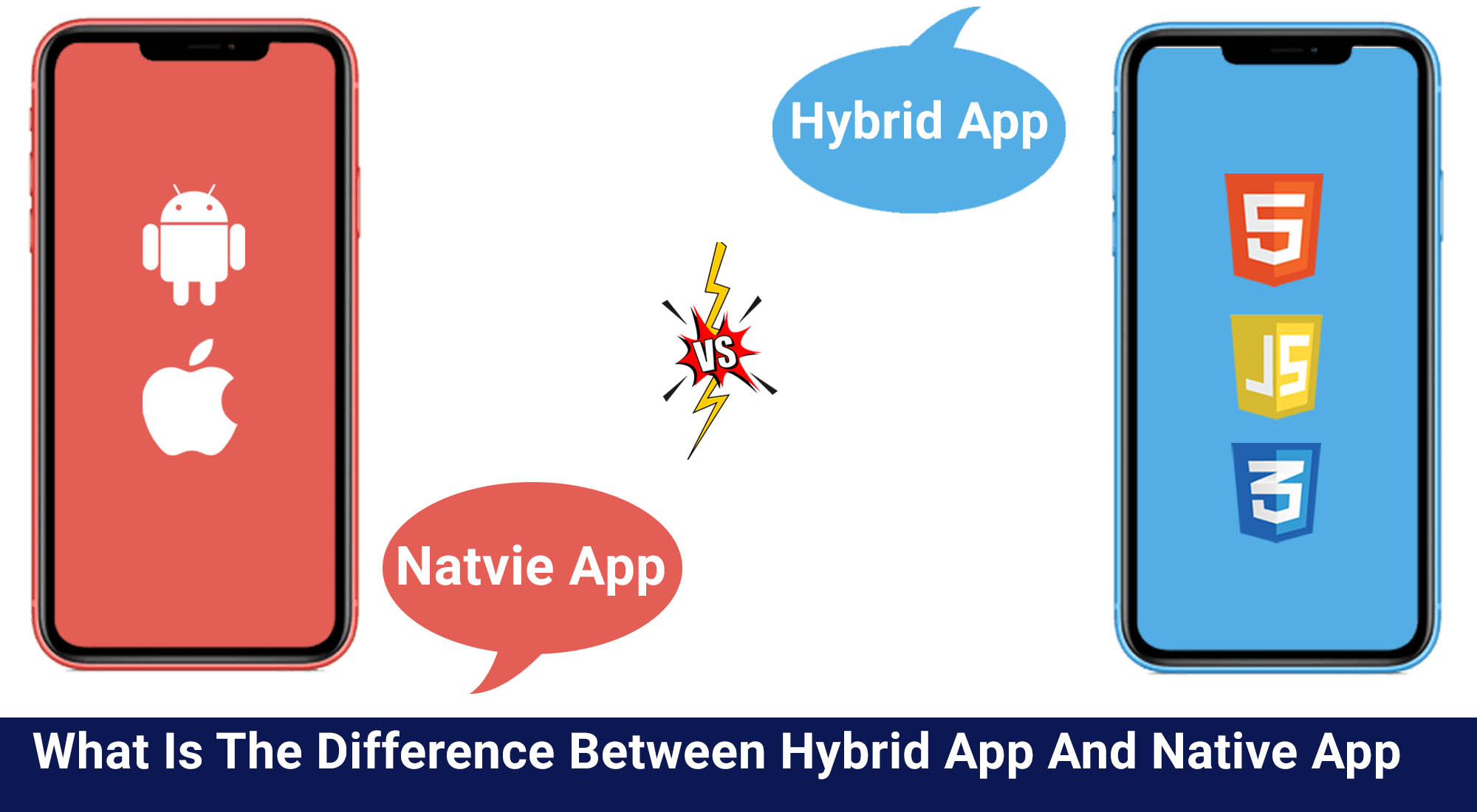
What is a Mobile app and Mobile app statistics
Mobile App :A mobile application also known as a mobile app or surely an app is a computer program or software utility designed to run on a cellular tool along with a phone. Mobile apps programs often stand in evaluation to desktop programs that are designed to run on computing device computer systems, and web packages that run in cell net browsers rather than immediately at the mobile tool.
In layman’s terms, A mobile application is a type of application designed to run on a mobile device. Basically there are 3 Different Types Of Mobile App Development 1) NATIVE APP , 2) HYBRID APP and 3) WEB APP
Mobile app statistics : Here, let’s focus on the mobile app statistics of 2022.
- Around 3739 android apps are added to the Play Store every day around the globe.
- 81.8% of Facebook users use Facebook on the mobile app.
- People considered 68% of web sites from a smartphone in 2020
- 25% of mobile apps are left unused after a point of time use.
- There are 104,911 paid apps on the Google Play Store
- 1 billion human beings use Google Maps every month.
- There are 477,877 gaming apps in Google Play Store in 2021
- There are 728,020 app publishers on the iOS app and 1,031,894 app publishers on the Play Store
- 49% of people regularly visit the Google Play Store.
What is meant by a Hybrid app ?
Hybrid apps are a mixture, as the name hybrid, of both native and web solutions.
A hybrid app is a software program application that combines elements of both native apps and internet applications. Hybrid apps are web apps that have been installed in a native app shell. Once they're downloaded from an app kept and installed, the app shell is in a position to connect with something the mobile platform provides through a browser it truly is embedded inside the app. The browser and its plug-ins run at the user end.
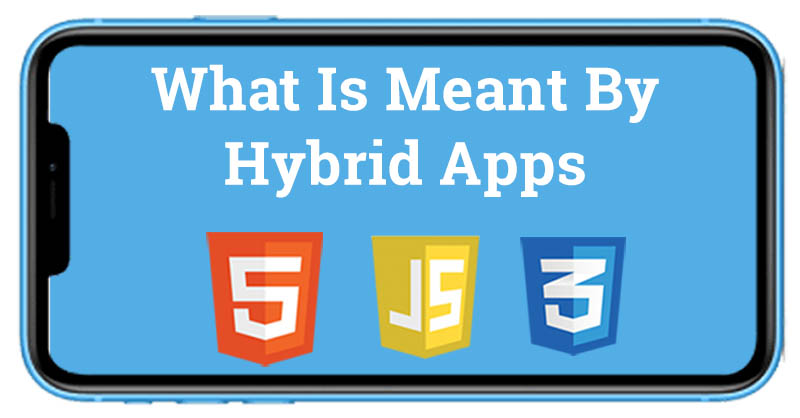
Hybrid apps are famous due to the fact they allow builders to jot down code for a mobile app and accommodate it over more than one platform. Technology used to build hybrid mobile apps add layers among the source code and the target platform, they'll carry out slightly slower than the native app or web variations of the identical app.
Advantages of Hybrid Apps
1) Better User Interface :You ought to have noticed the trade within the internet site look and functionalities when juggling between distinctive browsers or systems, and the same applies to the apps. But if an app is evolved on a hybrid platform, the hybrid app UI stays responsive and gives constant user enjoyment across more than one mobile platform.
2) Excellent Loading speed :As hybrid apps are lightweight, it doesn’t take a great deal of time to load the high-definition photos and content. Thus, hybrid apps load content material lots quicker than the web and local apps. Even in case of a refresh or reload, the hybrid app doesn’t face any issue and also works flawlessly first-class in a sluggish internet connection.
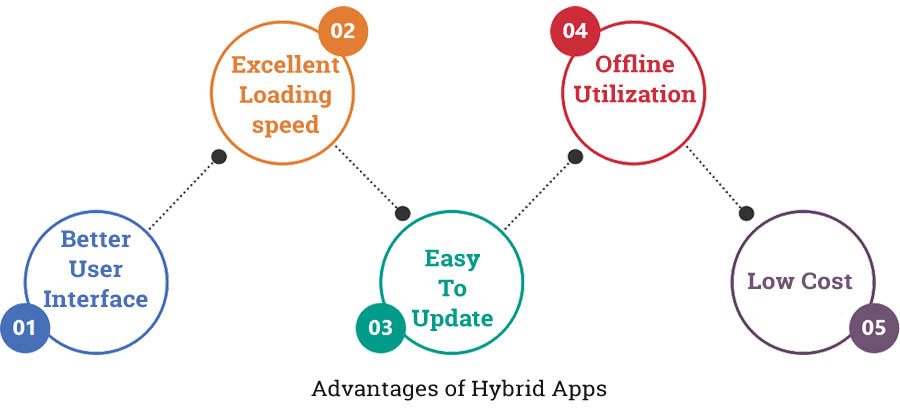
3) Offline Utilization :For offline use, the hybrid apps shop the gadgets API and then deploy when the tool is going offline due to weak or no connectivity. It facilitates to quick loading of the app and enables the user to reduce data utilization & consumption. With this brilliant advantage, the hybrid application has more ratings than the native app software.
4) Availability of Resources :The availability of resources is one of the pinnacle problems that the developers face now and then more often. But with the hybrid mobile app development, all of the assets are available with no trouble and this protects the companies from shelling out a massive sum in developing software as hybrid applications. Also, hybrid apps are less expensive than native apps.
5) Less development cost :If hybrid apps are compared to the native and web app, hybrid apps are pretty cost-powerful; thanks to their single code base usability. With a single code, the app can be created on more than one mobile app space. Also, some particular popular equipment and libraries genuinely reduce down on more efforts and time from the developer's aspect.
Disadvantage of hybrid app
1) Slow Performance :Analyze both the Hybrid app and native app. Both the apps have comparable capability but a hybrid app has a slow-performance level in comparison to native software.
2) Functionality limitations :Hybrid software development won’t be the right preference for you if your application development involves complicated functionality and functions.
Some of the hybrid frameworks like PhoneGap don't have complete native functions. In case your application includes many complex capabilities and functionalities then the hybrid app is not a good idea for the development.
Example of hybrid app
There are many examples of hybrid apps such as Gmail, Instagram, Twitter, Uber, and many more. Let’s read them in detail.
1) Gmail : Gmail is one of the popular hybrid app examples that has redefined nowadays cross-platform marketplace. In the basic shape, Gmail is a robust electronic mail carrier tool, with hundreds of downloads within the modern-day commercial world. This hybrid application example becomes eminent through HTML. With HTML5, Gmail has boosted the consumer experience with many advanced functionalities and features.
2) Instagram : As one of the biggest social networking structures, Instagram has placed its call on 2022’s hybrid app examples review. This utility has witnessed incredible growth over the last decade with better user engagement every day. Instagram is mainly popular among millennials as a regularly-used app to capture every moment in their lives. Supported via the HTML5 codebase, the app helps offline statistics by presenting an unlimited approach to features.
3) Twitter : Twitter is another popular social networking website and one of the maximum sought-after hybrid app examples over a previous couple of years. What is important in the app is that it types out all the drawback factors of the cross-platform apps, which is mainly regarding overall performance issues. Thanks to the easy performance and fast loading velocity, Twitter has changed customers’ belief of hybrid programs, as a result, boosting the demand for these apps among agencies.
4) Uber : Uber is the software on the list of quality hybrid app examples. It’s a taxi-reserving service with an intuitive and easy person interface for easy navigation. This consumer-pleasant hybrid app outperforms its rival for letting users book taxis problem-free. The app comes with the capability to perform fast on multiple devices and offers each iOS and Android users lots of dynamic functions. Undoubtedly Uber has revolutionized the global online taxi reserving marketplace.
Hybrid app development cost
For mobile app development, imparting a precise value is quite tough. It depends on various factors which include the framework used, the complexity of the app, features to be covered, the place of the development crew, and so on.
Hybrid app improvement is normally less costly than native app development.
On a median, building hybrid apps will take around 200 – 1500 hours. And the fee of app development may additionally range between $5000 to $50,000 depending on the app necessities.
For mobile app ideas that are complex, like the company's apps or games, the time of development, in addition to the fee, will increase.
What is meant by Native app ?
A native application is a software program software this is evolved to be used on a specific platform or tool.
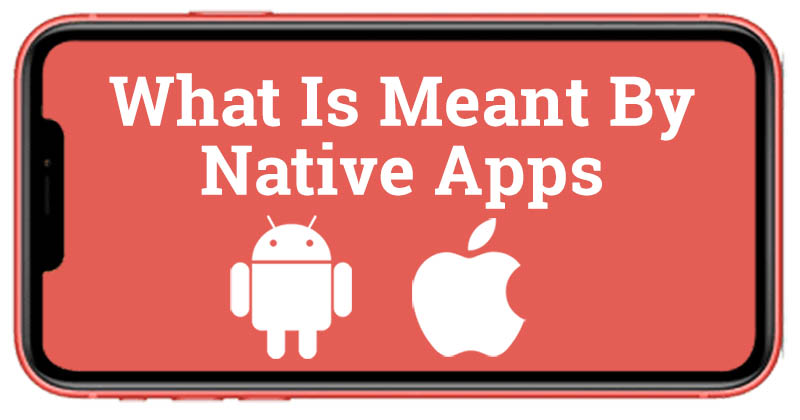
Because a native app is built to be used on a specific device and its OS, it has the potential to apply for unique tools, hardware, and software programs. Native apps can offer optimized overall performance and take benefit of the advanced new technology, such as a GPS, in comparison to web apps or mobile cloud apps developed to be typical over more than one system.
Advantage of Native app
1) Speed : Native apps because the name mentions are designed in particular for specific systems. As a result, they characteristic the use of the tools that have inbuilt functions which makes them very rapid. Even apps with high processor utilization will work without problem. This overall performance enhancement makes it endorsed for games and applications.
2) User Friendly : A native app is related to the device operating system. As a result, it's far geared up with extraordinary functionalities consisting of a digital camera, GPS, calendar, and microphone. Native apps correctly make use of these features to provide a more desirable experience to its user.
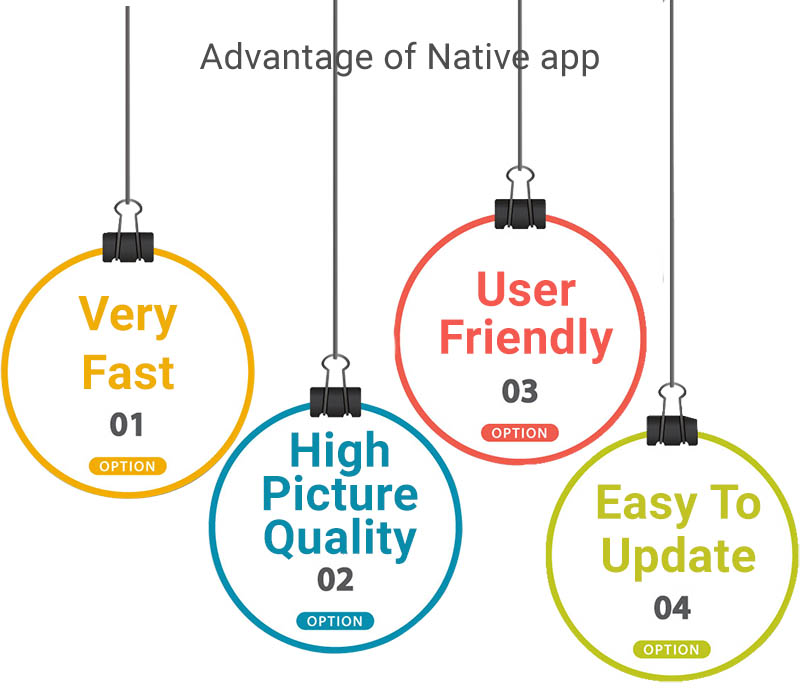
3) Picture quality : Native apps offer better pictures with their modern resolution and orientation. It is decided by the usage of the element ratio. Aspect Ratio simply means the ratio among the width and height. Even for gadgets with one-of-a-kind display sizes, the Dots Per Inch (DPI) remains the equal
4) Availability : Users can effortlessly locate native apps from App Store or Play Store. Even afterward the apps may be downloaded without problems with simply one click. And also, the apps are finished examined by the stores before the approval.
Disadvantages of Native app
1) Cost : The basic cost involved within the creation and launch of a native app is extensively higher. This is due to the truth that there need to be separate versions of the equal application. Even a vast amount is needed to maintain the app. Nonetheless, native apps are cost-effective in the long term.
2) Time Consuming : Since native apps are evolved for multiple systems, it calls for extra time. Native apps can also require a big amount of time for making as compared to their counterparts. Developers of the native app must take time to jot down codes for unique O/S.
3) Download is necessary : Before the usage of a native app, it’s required to download it from either App save or Plays shop. There are numerous methods involved in downloading a native app. The user needs to locate the app, cross through the terms & conditions, and then go through the download system. Sometimes the download procedure can be prolonged and the users would not have patience.
Example of Native app
Examples of native apps include a long list. Let’s discuss a few of them.
1) WhatsApp : Developed as a native app for iOs and Android smartphones, WhatsApp is a usually-used messaging service in many components of the world. Noticeably, this platform became the fourth-maximum downloaded app globally in Q3 2020, with around one hundred forty million times. Thus, this native app great example of communication tools within the place of work
2) Spotify : Spotify – a nicely-appreciated native app example – claims itself as of have to-have downloads on the smartphones of music fans. it is a digital song provider hub that gives customers access to songs and podcasts from file labels and media corporations universally. Other than it, Spotify is likewise one of the most prominent cloud-native software examples. Thanks to Google Cloud, Spotify has unlocked large overall performance efficiency in its workloads to better serve the customers.
3) Tesla : Tesla, the most important name in the electrical motor industry, is likewise any other one popular within the listing of native app examples. The Tesla smartphone software allows its clients to remotely function their vehicles. With the Tesla app, you could maintain music of the way fast your automobile is charging and even begin and stop it. In phrases of layout, it looks and seems like a game way to the gloomy topic. The app is available on both the Google Play Store and the Apple App Store.
Native app development cost
The value of building a Native app software relies upon many factors, such as the complexity of the challenge, the functionality required within the application, the design of the application, and the application distribution. The average price of growing a React Native app can range from $30,000 to $100,000.
Native App vs Hybrid App
| Aspects | Native apps | Hybrid Apps |
|---|---|---|
| Languages | Native | Native + web |
| User interface | Rich interface | it won’t give a fully native experience for the users due to the usage of web technology |
| Platforms | Single | Multiple |
| Security | The attacks occur in insecure data storage, loose implementation of SSL, unlimited leaks of data, & code injection. | The attacks occur in insecure data storage, loose implementation of SSL, unlimited leaks of data. Apart from these, the additional layer leads to some problems. |
| Framework | AI-supported by OS | React Native, PhoneGap (on HTML5, CSS, JavaScript |
| Device-specific features | High | Moderate |
Which is a better native or hybrid app ?
Both the apps have their advantages and disadvantages as we have discussed above and they are using different Programming Language for mobile app development, But the one thing that can be said is native app development is better than hybrid app development.
High performance and a single unique codebase are the answer for that. Though hybrid apps are great for developers who are on a tight budget, native apps are not preferable if you have a reasonable budget. The users and developers are the ultimate decision-makers.
Conclusion-
Both the apps are perfectly strong and sufficient to fulfill all the requirements and demands of the developers as well as the user. Now, the decision of which to choose depends upon the developers.

- What is cross platform mobile app development
- What is hybrid mobile app development
- What is native mobile app development
- What is mobile app development
- What are the different types of mobile app development
- What is Web based mobile app development
- What technology framework is used to build hybrid mobile apps
- Which Programming Language is used for Android Application Development
- Best Programming Language For Mobile App Development